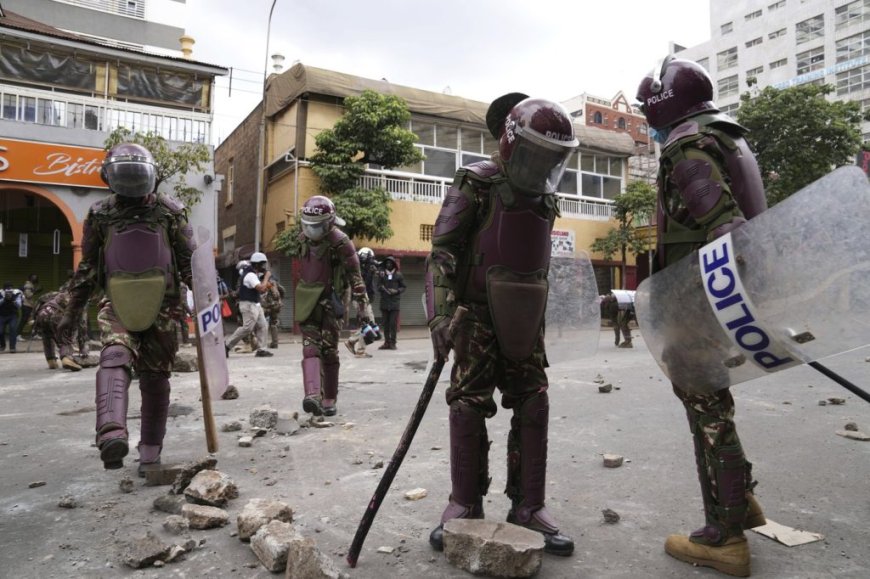Police Clash with Protesters in Kenya Amid Finance Bill Controversy
Kenyan police clashed with protesters in Nairobi on Thursday as anti-tax demonstrations persisted despite President William Ruto's decision not to sign the controversial finance bill. The proposed legislation, which included new taxes on items and services like egg imports and bank transfers, had sparked deadly unrest earlier in the week.

Kenyan police clashed with protesters in Nairobi on Thursday as anti-tax demonstrations persisted despite President William Ruto's decision not to sign the controversial finance bill. The proposed legislation, which included new taxes on items and services like egg imports and bank transfers, had sparked deadly unrest earlier in the week.
The finance bill faced fierce opposition from a public already burdened by rising living costs. On Tuesday, protesters stormed the parliament building, leading to chaos that resulted in the deaths of up to 22 people as police opened fire. Despite the president's vow to make budget cuts and send the bill back to parliament, distrust remained high among the populace.
Continued Protests
Protests on Thursday were smaller in scale compared to Tuesday’s, but were still met with heavy police resistance. Tear gas was used to disperse demonstrators, and the military patrolled the streets despite a court order suspending their deployment to support the police. Deputy President Rigathi Gachagua urged young protesters to halt their demonstrations and pursue dialogue instead.
Activists and Public Sentiment
The protest movement, initially driven by young people online, has grown into broader calls for President Ruto's resignation. Activists were divided on Thursday’s strategy: some, like Boniface Mwangi, called for peaceful marches to honor those killed, while others, including Francis Gaitho, pushed for a march to the presidential residence.
Analyst Javas Bigambo highlighted the public’s lack of trust in Ruto’s promises to implement austerity measures, noting the government's need to open dialogue and ensure a consultative budgeting process.
Government and International Reactions
Parliament Speaker Moses Wetangula referred the president’s memorandum on the finance bill to the finance committee, which will report back after the parliament recess ends on July 23. Meanwhile, business owners in Nairobi guarded their shops against potential looting and vandalism, and protests also occurred in other major towns like Mombasa, Kisumu, and Migori.
The International Monetary Fund (IMF), which had agreed on reforms with the Kenyan government, expressed concern over the violence and stressed the importance of Kenya overcoming its economic challenges.
Diplomatic Engagement
U.S. Secretary of State Antony Blinken spoke with President Ruto, thanking him for efforts to reduce tensions and emphasizing the need for restraint by security forces. The U.S. has shown strong support for Ruto, designating Kenya as a major non-NATO ally in sub-Saharan Africa and welcoming Kenyan police to lead a multinational force against gangs in Haiti.
The ongoing unrest and government's response to the protests will continue to test Kenya's political stability and its relationship with international partners.
Tags:
- African Union
- crisis
- Sudan
- Africa
- Algeria
- Angola
- Benin
- Botswana
- Burkina Faso
- Burundi
- Cameroon
- Cape Verde
- Central African Republic
- Chad
- Comoros
- Democratic Republic of the Congo
- Djibouti
- Egypt
- Equatorial Guinea
- Eritrea
- Eswatini
- Ethiopia
- Gabon
- Gambia
- Ghana
- Guinea
- Guinea-Bissau
- Ivory Coast
- Kenya
- Lesotho
- Liberia
- Libya
- Madagascar
- Malawi
- Mali
- Mauritania
- Mauritius
- Morocco
- Mozambique
- Namibia
- Niger
- Nigeria
- Republic of the Congo
- Rwanda
- Sao Tome and Principe
- Senegal
- Seychelles
- Sierra Leone
- Somalia
- South Africa
- South Sudan
- Sudan
- Tanzania
- Togo
- Tunisia
- Uganda
- Zambia
- Zimbabwe.













































